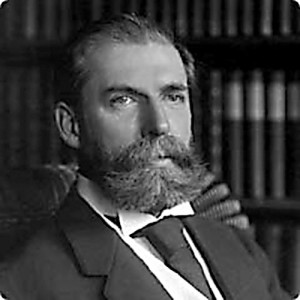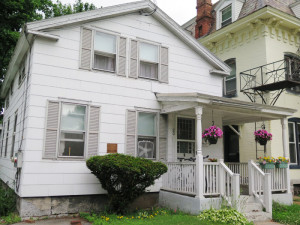By William Loughrey, Special to The Chronicle
Charles Evans Hughes was born in Glens Falls to a woman of exceptionally strong faith and a father who was an abolitionist preacher, a head of the anti-slavery forces in the upper Hudson River Valley. Throughout his distinguished public career, Hughes was a civil rights stalwart, a role for which he has not been accorded credit.
For a century and a half, America’s legal system followed a shameful and inhuman path on the issue of slavery, first ignoring that terrible evil and then siding with the pro-slavery forces. The turnabout came only when Charles Evans Hughes served on the Supreme Court and then became its leader as Chief Justice.
When the Supreme Court moved from its cozy, almost secluded quarters in the Capitol to the Taj Mahal-like building it presides in today, reality struck.

The cafeteria refused to serve a black lawyer who had argued a case before the Court. Justice Louis Brandeis, the first Jewish member of the Court in its 150-year history, had to intervene to have the gentleman given lunch.
When the chief administrator of the Court next paid a visit to Chief Justice Charles Evans Hughes, he asked what could be done about this knotty problem. Hughes said it was very simple, just read the inscription on the front of the building, which proclaims: Equal Justice Under Law. The court administrator said that the problem was much more complicated than that.
Hughes promptly informed him, if he thought that to be the case, he would be fired.
This was just one example of Hughes’s campaign to right what he labeled in the context of the Dred Scott decision, the nation’s “greatest self-inflicted wound.”
Hughes may have been the only national candidate of the Jim Crow-era to campaign in the black churches of the South. He invited Booker T. Washington to his church in New York, personally escorted him and his wife to the head table, and ignored those who were outraged.
The infamous Dred Scott opinion was a dead-end decision that plunged the nation into Civil War, but it marked only the beginning of a series of major court cases that voided the Civil Rights Act of 1875, deprived blacks of basic constitutional rights, and gutted the Thirteenth, Fourteenth and Fifteenth Amendments to the Constitution, which were the most important positive results of America’s terrible Civil War.
Whereas in the era before the Civil War, the federal government, dominated by the South, made decisions that favored slavery in almost every instance, the Courts afterwards handed down opinions almost as if the war, which in terms equivalent to today cost 10 million lives and several trillion dollars, had never occurred.
Charles Evans Hughes took heroic actions to turn around the United States legal system, attacking three major prongs of the racist, white supremacist system: Johnny Reb, Jim Crow, and Judge Lynch.
Slavery was gone, but in the absence of large-scale land redistribution, the plantation system endured.
When white supremacist President Andrew Johnson limited Reconstruction reforms to the formal institution of slavery, the spirit of the Confederacy, Johnny Reb, survived and sought through written contracts to re-establish its authority over every aspect of laborers’ lives.
The contracts provided for labor in gangs from sunup to sundown, required the contractor to obey the plantation owner, and regulated every aspect of the laborers’ life outside of work. In other words, these contracts were the same as slavery with subsistence wages that barely covered food, clothing and shelter.
In his first decision from the bench, Hughes attacked these contracts as peonage, cleverly arguing that either in the North or South, these contracts would be viewed as such and a violation of the Thirteenth Amendment ban on slavery. Using this line of argument, he obtained broad support from his colleagues on the Court.
Based on restrictions that were developed to limit the rights of free blacks in the North before the Civil War, Southern states developed the Jim Crow system to maintain their authoritarian control over blacks after the war. These Black Codes governed the lives of former slaves in ways almost as harsh as the plantation system.
The separate but equal doctrine was applied to all public facilities, including schools, overnight lodging, dining and transportation. In fact, blacks were forced to use facilities that were far inferior to those provided to whites. Restrictions on suffrage and the judicial system made it amost impossible for blacks to vote or participate in the legal system.
Blacks were often convicted by all-white juries in the lily-white legal system. When he went on the bench, Hughes worked to ensure that public facilities were in fact equal, overturned convictions by all-white juries, and tried to force the South to implement laws to accord blacks suffrage, albeit these decisions were too little too late.
Yet, his actions would set a precedent for the future when the Court would become more courageous.
After the Civil War, Ku Klux Klan violence spread in almost every Southern state against Republican leaders, black and white. More than 3,000 freed slaves and their white Republican allies were murdered in a campaign of terrorist violence that overthrew the only democratically and representatively elected governments the Southern states would know for a century.
During the next few decades, more than 5,000 people would be lynched under the auspices of Judge Lynch. Only one man is known to have survived this system of vigilante justice. Convictions were obtained in only about one percent of these murders.
Judge Lynch supervised the convict-lease system, where blacks were thrown in jail with long sentences for minor violations and literally worked to death. The convict-lease system can “find parallel only in the persecutions of the Middle Ages or in the prison camps of Nazi Germany.”
In mining camps, prisoners worked through the winter without shoes, standing in water much of the time. Gangs of three were required to mine a certain amount of coal a day upon penalty of a severe flogging. Prisoners would lie dying in their rooms with skin peeling off in pieces as a result of beatings, animals crawling over them while their bones were almost sticking through their skin for lack of food.
The mortality rates at these camps were 10 to 25 percent a year.
The Supreme Court decided three cases involving lynching, and there were no convictions for that offense. In the only one of these cases where Hughes was on the bench, he and Oliver Wendell Holmes issued a strong dissent, concluding: “Mob law does not become due process of law by securing the assent of a terrorized jury.”
In this, the famous Leo Frank case, Hughes and Holmes wanted Frank to get a fair trial with an opportunity to be heard, and insisted that the Court “declare lynch law as little valid when practiced by a regularly drawn jury as when administered by one elected by a mob intent on death.”

Frank was forcibly removed from his jail cell, driven more than 100 miles, and lynched shortly after this decision. No one was ever convicted of this crime. The presiding judge and prosecuting attorney for the county where the lynching occurred were the masterminds of this premeditated murder!
By the time of this lynching, Hughes had left Court to run for president. As Chief Justice, Hughes was constantly looking for cases to bring before the Supreme Court to overturn decisions by these Southern kangaroo courts.
Americans today are outraged by public officials such as Woodrow Wilson who had views that were, by today’s standards, racist and white supremacist. It should be noted, however, that Wilson was squarely within the mainstream of the Southern and American legal thought of his times.
Charles Evans Hughes was the outlier who stood up to the political correctness of his era. When Hughes ran against Wilson a century ago, no one paid attention to what was undoubtedly the most extreme difference of opinions on civil rights in the history of presidential elections! What heroes and prejudices are we overlooking today, on the birthday of Martin Luther King?
Copyright © 2016 Lone Oak Publishing Co., Inc. All Rights Reserved.
 Glens Falls Chronicle Serving the Glens Falls/Lake George region; Warren, Washington and northern Saratoga counties since 1980
Glens Falls Chronicle Serving the Glens Falls/Lake George region; Warren, Washington and northern Saratoga counties since 1980

